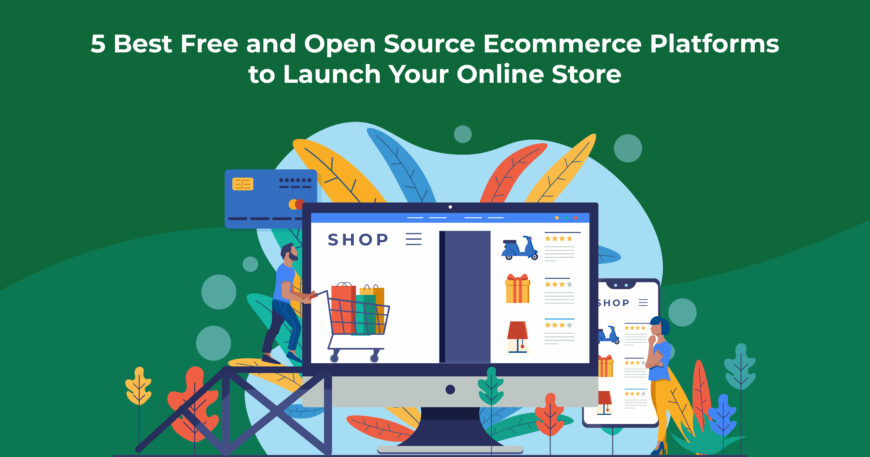Are you looking to start an online store without breaking the bank? Have you considered using a free or open source ecommerce platform?
Ecommerce has become a booming industry with more and more people turning to online shopping. However, setting up an online store can be overwhelming, especially when choosing the right ecommerce platform. With the wide range of options available, it can take time to determine which platform is best for your business needs and budget.
Fortunately, there are a variety of open source and free ecommerce platforms that can help you get started. In this article, we will explore the top 5 platforms to consider for 2023. Whether you’re a small business owner or an entrepreneur just starting out, we’ve got you covered with a comprehensive list of the best platforms to choose from. So, let’s dive in and find the perfect ecommerce platform for your business!
Let’s look at some of the top open source ecommerce platforms currently available. Read on!
1. WooCommerce
WooCommerce is an incredible plugin that has revolutionized ecommerce websites for WordPress users. With its robust inventory management system and other ecommerce functionalities, WooCommerce has made it possible for businesses of all sizes to sell their products and services online.
Over 5 million ecommerce websites rely on WooCommerce to power their online stores, including some big names like New Balance and Subaru. According to Statista’s market share data, WooCommerce is the most widely used ecommerce platform among the top 1 million ecommerce websites, with a 29% market share. Shopify, a competing platform, trails behind with a 21% market share.
Despite being an open-source platform, WooCommerce is surprisingly easy to learn and use. It has a flexible and customizable interface, much like its parent platform, WordPress, and boasts a wide selection of free and paid WooCommerce themes. In addition, users have access to a massive library of extensions, giving them even more options for customization.
Another advantage of using WooCommerce is its built-in security features. Users can rest easy knowing that their online stores are protected against hackers and other threats. Plus, WooCommerce supports multiple integrations, making it easy for users to connect their store to other apps and tools.
2. Adobe Commerce (Formerly Magento)
Adobe Commerce (formerly Magento) is a popular ecommerce software part of the Adobe Experience Cloud. It is a powerful and customizable open source ecommerce platform used by over 250,000 enterprise-scale online stores worldwide. Many well-known companies, such as HP (Hewlett-Packard), also use Adobe Commerce for their ecommerce needs. However, because it was derived from Magento, which is known to target developers, Adobe Commerce requires advanced technical skills.
One of the key features of Adobe Commerce is its 24/7 customer support, which ensures that users can get help whenever needed. Additionally, Adobe Commerce allows multiple extensions via the Magento marketplace, allowing users to customize their online store to meet their specific needs. API integrations are also available, which can help users connect Adobe Commerce to other software or tools they may be using.
Another important feature of Adobe Commerce is its built-in native SEO (Search Engine Optimization) capabilities, which help online stores rank higher in search engine results. Additionally, Adobe Commerce has built-in analytics tools that can help users track essential metrics and make data-driven decisions to improve their ecommerce store’s performance.
3. Drupal Commerce
Drupal Commerce is a powerful ecommerce platform built on top of the Drupal CMS. As an ecommerce CMS open source similar to WordPress, Drupal CMS provides a flexible and scalable framework for users to develop and manage their ecommerce websites.
One of the critical advantages of Drupal Commerce is its built-in CMS feature, which allows users to create and manage content-rich pages optimized for search engines. This is important because Google algorithms are increasingly prioritizing content marketing, making it essential for ecommerce platforms to incorporate a decent CMS feature if they want to rank for content.
Due to its powerful features and flexibility, Drupal Commerce is a popular choice for enterprise websites. It also offers a range of features such as SEO and marketing features, order management tools, reporting and analytics, and integration with other systems via RESTful API.
These features allow users to manage and grow their ecommerce business efficiently and effectively. Additionally, Drupal Commerce is free to use, making it an affordable choice for businesses of all sizes.
4. OpenCart
OpenCart is a popular open source ecommerce platform used by over 400,000 website owners worldwide, including Red Cross UK. It offers a range of features, including multi-store management from one interface, a large marketplace full of themes and extensions, and backup and restore tools. Additionally, OpenCart offers support for abandoned shopping carts and discount coupons, as well as a mobile app.
However, there are some limitations to using OpenCart. One of the main drawbacks is its limited SEO and marketing functionality, which may make it challenging for users to grow their ecommerce site. Additionally, OpenCart does not provide customer support, which means users will need technical knowledge to benefit from the platform.
Despite these limitations, OpenCart remains a popular choice for many ecommerce website owners due to its user-friendly admin dashboard, a large marketplace with over 13,000 add-ons and extensions, and support for mobile app development. Best of all, it is available for free, making it an affordable choice for businesses of all sizes.
5. Shopware
Shopware is a German open source ecommerce platform that was founded in 2000. The platform is built with Symfony powering the backend and Vue.js on the frontend, and it has a large developer community with over 100,000 customers worldwide. Notable brands like Aston Martin and M&Ms are among its customer base.
Shopware is packed with features, including fully integrated CMS capabilities similar to Drupal and integrated SEO and marketing tools. It also has a drag-and-drop interface that allows easy customization of online stores. The platform supports integrations with Google Shopping and social media. Users can choose between self-hosted or cloud-hosted variations.
However, the free version of Shopware offers limited functionality, and customer support requires an additional subscription. Premium plans start at €199 ($210) per month, which may be a drawback for some small businesses.
Wrapping Up
Businesses of all sizes require a dependable and adaptable platform to sell their products online, and the demand for ecommerce platforms has been rising quickly in recent years. The top 5 free and open source ecommerce platforms for 2023 covered in this article provide a selection of features and functionalities to assist companies in developing an online store that satisfies their requirements.
Do you have questions about the top open source ecommerce platforms? Drop your comments down below and we’ll gladly help you!





